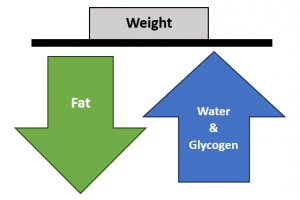You dieted most of your life, lost weight, maintained it for a while, and then gained it all back plus some. You were tired of yoyo dieting and not seeing sustainable weight loss, so you decided to seek out professional help. You wanted a tool to help you move forward, so you decided to have weight loss surgery. Fast forward, you had your bariatric surgery 3 weeks ago and everything was going really well. 1-2 lbs weight loss daily. Who would not like that? You think “wow this is amazing, and I should have done this sooner” until you hit the three-week stall. The scale is just not budging! You start to panic and doubt your decision. “What am I doing wrong?” you ask yourself every time you see the same number on the scale. What the heck happened?
I am here to tell you that everything is going to be all right. Don’t lose hope. You are not doing anything wrong, and this stall is very common for most patients. Now, let’s talk about why this happens and what you can do about it.
The Reason
In the first few weeks after weight loss surgery, patients are on liquid diet and calorie intake is very minimal. For that reason, the body is using glycogen stored in muscle and liver. Glycogen is a storage body’s form of glucose or sugar. One gram of glycogen is bound to 3 grams of water, so when as the body uses glycogen, the water is lost. In another word, most of the weight loss the first few weeks after surgery is water weight.

As patients transition and advance their diet, calorie intake increases, and the body starts restoring the glycogen in the muscles and liver. In the meantime, patients are still burning and losing fat. For that reason, patients do not see much weight loss on the scale around week 3 or 4.

What Can You Do About It?
- Weigh yourself once a week instead of daily. Take body measurements because you might be losing inches but not seeing weight loss on the scale.
- Focus on non-scale victories such as your clothes fitting loser, your energy is improved, and you can do more with less pain.
- Do not compare yourself with others. Every person’s weight loss is different. You are not in competition with anybody!
- Drink plenty of fluids to keep yourself hydrated. Remember that we said your body sheds a lot of water the first 2-3 weeks. Unless recommended otherwise, aim for at least 64 oz of hydrating fluids.
- Don’t forget about protein! Protein is the building block of muscles so it can help patients in losing fat instead of muscle, supporting metabolism. Moreover, it keeps you full longer and also helps with wound healing. Because food portions are much smaller after bariatric surgery, it’s necessary to have something with protein every 2-3 hours in order to reach your protein goal. Tracking your food with an app such as MyFitness Pal or the Baritastic app is highly encouraged.
Now you know why the so called 3-week weight stall happens and what you can do about it. Although it is understandably difficult, you need to trust the process and your bariatric team. Do not hesitate to seek help and support. Your registered dietitian can help you with strategies to help you with long term successful weight loss.

